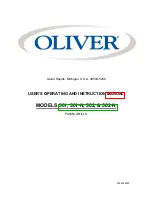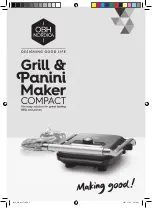
Safety
2
power tool repaired before use.
Many accidents
are caused by poorly maintained power tools.
f)
Keep cutting tools sharp and clean.
Properly
maintained cutting tools with sharp cutting edges
are less likely to bind and are easier to control.
g)
Use the power tool, accessories and tool bits
etc, in accordance with these instructions,
taking into account the working conditions and
the work to be performed.
Use of the power tool
for operations different from those intended could
result in a hazardous situation.
5) SERVICE
Have your power tool serviced by a qualified repair
person using only identical replacement parts.
This will ensure that the safety of the power tool is
maintained.
DRILL SAFETY WARNINGS
a)
Wear ear protectors when impact drilling.
Exposure
to noise can cause hearing loss.
b)
Use auxiliary handle(s), if supplied with the tool.
Loss of control can cause personal injury.
c)
Hold power tool by insulated gripping surfaces,
when performing an operation where the cutting
accessory may contact hidden wiring or its own
cord
. Cutting accessory contacting a “live” wire may
make exposed metal parts of the power tool “live” and
could give the operator an electric shock.
d)
Hold power tool by insulated gripping surfaces,
when performing an operation where the fastener
may contact hidden wiring or its own cord.
Fasteners contacting a “live” wire may make exposed
metal parts of the power tool “live” and could give the
operator an electric shock.
e) Wear safety goggles to protect your eyes from flying
particles and splinters.
Additional safety warnings
WARNING
The product is not intended for use by persons
(including children) with reduced physical, sensory
or mental capabilities, or lack of experience and
knowledge, unless they have been given supervision
or instruction concerning use of the product by a
person responsible for their safety.
Children should be supervised to ensure that they
do not play with the product.
a) When working on walls, ceilings or floors, avoid hitting
electrical wiring and gas or water pipes.
b) We recommend the use of a residual current device
with a residual current rating of 30 mA or less.
INTENDED USE
a) Drilling in all types of wood.
b) Drilling in metals: steel, brass, aluminum sheets,
stainless steel and pipe (do not use impact drilling on
these materials).
c) Drilling in masonry: stone and masonry (use impact
drilling), wall tiles (use ordinary drilling first, then impact
drilling).
Do not use this product in any way other than those stated
for intended use.
MAINTENANCE
WARNING
The product should never be connected to a power supply
when you are assembling parts, making adjustments,
cleaning, performing maintenance, or when the product
is not in use. Disconnecting the product will prevent
accidental starting that could cause serious injury.
WARNING
When servicing use only identical replacement parts.
Use of any other parts may create a hazard or cause
product damage.
■
Avoid using solvents when cleaning plastic parts. Most
plastics are susceptible to various types of commercial
solvents and may be damaged by their use. Use clean
cloths to remove dirt, carbon dust, etc.
WARNING
Do not at any time let brake
fl
uids, gasoline, petroleum-
based products, penetrating oils, etc., come in contact
with plastic parts. They contain chemicals that can
damage, weaken or destroy plastic.
■
Electric tools used on fiberglass material, wallboard,
spackling compounds, or plaster are subject to
accelerated wear and possible premature failure
because the fiberglass chips and grindings are highly
abrasive to bearings, brushes, commutators, etc.
Consequently, we do not recommend using this tool for
extended work on these types of materials. However, if
you do work with any of these materials, it is extremely
important to clean the product using compressed air.
WARNING
Always wear safety goggles or safety glasses with side
shields during power tool operation or when blowing
dust. If operation is dusty, also wear a dust mask.
Summary of Contents for RPD800
Page 1: ...ORIGINAL INSTRUCTIONS Percussion Drill RPD800...
Page 6: ...5 Unpacking x 1 x 1 x 1...
Page 7: ...6 Getting started 1 3 2 1 2 1 2 5 6...
Page 8: ...7 Getting started 4 3 7 1 2 3...
Page 9: ...Operation 8 1 2 1 2 2 3 1 3 2 1...
Page 10: ...Operation 9 1 2 3...






























